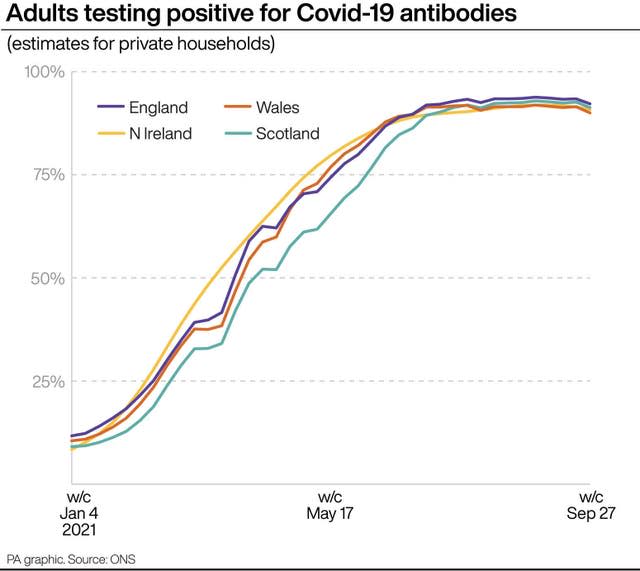Nine in 10 UK adults likely to still have Covid-19 antibodies
Around nine in 10 adults in all parts of the UK continue to have Covid-19 antibodies, new figures suggest.
The estimates range from 90.0% in Wales to 92.2% in England, with 90.8% for Northern Ireland and 91.3% for Scotland.
The presence of coronavirus antibodies suggests someone has had the infection in the past or has been vaccinated.
It takes between two and three weeks after infection or vaccination for the body to make enough antibodies to fight the virus.
Antibodies then remain in the blood at low levels, although these levels can decline over time to the point where tests can no longer detect them.

The latest estimates are from the Office for National Statistics (ONS) and are based on a sample of blood test results for the week beginning September 27.
They are largely unchanged on estimates for the last few months.
All figures are for people in private households and do not include settings such as hospitals and care homes.
The ONS said there is a “clear pattern” between vaccination and testing positive for Covid-19 antibodies, but “the detection of antibodies alone is not a precise measure of the immunity protection given by vaccination”.
Once infected or vaccinated, the length of time antibodies remain at detectable levels in the blood is not fully known.
It is also not yet known how having detectable antibodies, now or at some time in the past, affects the chance of getting Covid-19 again.
The estimated percentage of adults testing positive for antibodies remains at a high level across all regions of England, ranging from 90.8% in north-east England to 93.8% in London.
#COVID19 antibody positivity rates increased amongst younger adults, and there is evidence of a small decline in antibody positivity in older age groups https://t.co/pd6EsYRSgC pic.twitter.com/XHqmSlKiqj
— Office for National Statistics (ONS) (@ONS) October 27, 2021
When looking at age groups, percentages have increased in younger adults and are “showing signs of a slow decline” in older adults.
Many of the people in the sample who tested negative for antibodies in the most recent week had received their vaccinations in the early stages of the rollout, the ONS said.
Along with age, the first phase of the rollout prioritised individuals according to a range of factors, such as long-term health conditions and type of employment, and this “may help to explain the declining trend appearing in different age groups now”.
Antibody positivity is defined by a fixed concentration of antibodies in the blood.
Most people who are vaccinated will retain higher antibody levels than before they had the jabs, but may have a lower number of antibodies at the time of testing.
This does not mean that these people have no protection against new infection, the ONS added.
The latest estimates are too early to reflect any impact of booster doses of vaccine, which began to be rolled out in the UK in late September.

 Yahoo Finance
Yahoo Finance 